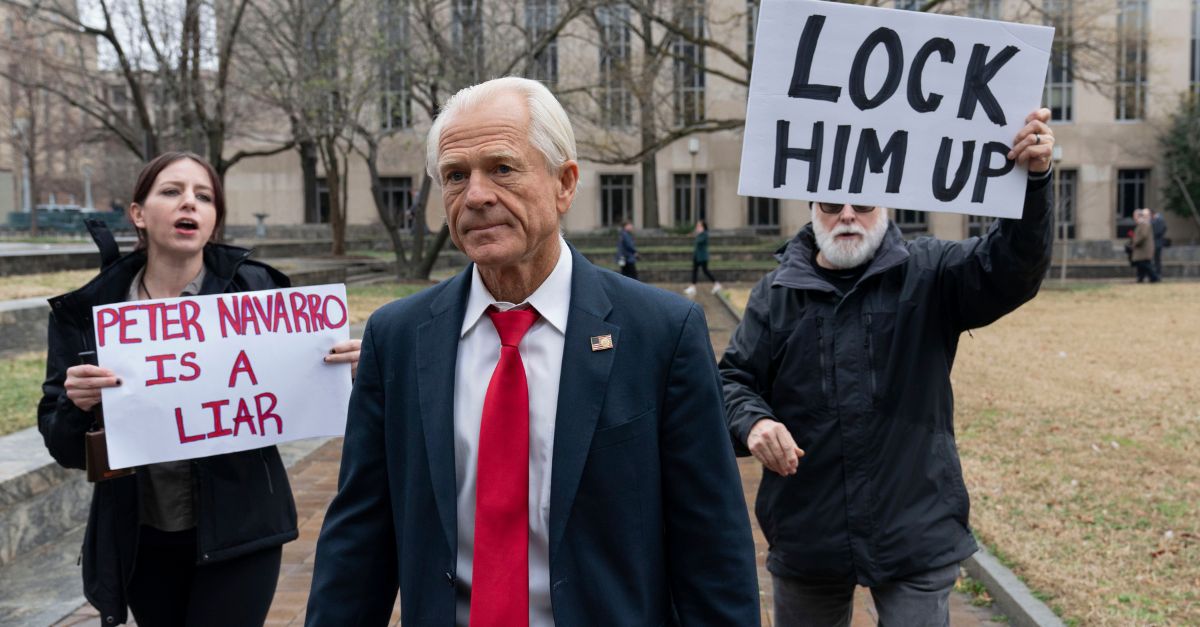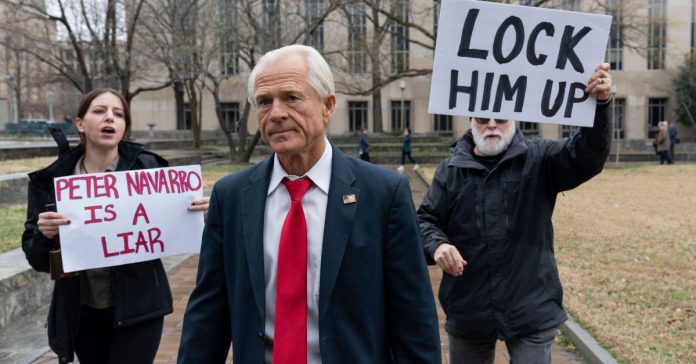
Former Trump White House official Peter Navarro followed by demonstrators leaves the U.S. Federal Courthouse in Washington, Thursday, Jan. 25, 2024. (AP Photo/Jose Luis Magana)
A federal judge in Washington, D.C. has ordered Peter Navarro, the former White House trade adviser to Donald Trump and self-professed champion of a plan to contest ballots in the 2020 election, to report to prison as he appeals his conviction for contempt of Congress.
U.S. District Judge Amit Mehta sentenced Navarro to four months in prison last month, telling him he failed to express “a word of contrition” nor provide suitable evidence at his trial about his blatant failure to comply with a congressional subpoena from the House Select Committee to Investigate the Jan. 6 Attack on the U.S. Capitol. The body had asked Navarro for key records relating to its probe, specifically information Navarro could disclose about his own public claims that he and ex-Trump adviser Steve Bannon devised a plan known as the “Green Bay Sweep” to usher Trump into the White House.
Notably, it was Navarro’s report on so-called voter fraud that Trump cited in a Dec. 19, 2020, tweet claiming the adviser had found “more than sufficient” proof to swing the victory his way.
In the 12-page order, Mehta flatly denied Navarro’s request for release pending his appeal unless the order is stayed or vacated by the circuit court in Washington, D.C.
Wrote Mehta:
In his sentencing memorandum, Defendant requested release pending appeal if the court imposed a term of prison. The court agreed to defer ruling on that request until after Defendant filed a supplemental brief, which he has now done. Defendant raises four grounds to support in his motion for release pending appeal … Defendant has not shown that any of those issues will pose a “substantial question of law” on appeal, his motion is denied.
As the judge noted, the federal criminal code dictates that a person can be released pending appeal if they provide clear and convincing evidence that they won’t flee, won’t pose a danger, or if their appeal is “not for the purpose of delay and raises a substantial question of law or fact like to result in reversal or an order for a new trial.”
Mehta felt there was “no dispute” that Navarro would flee nor did prosecutors argue that Navarro intended to delay proceedings. But he failed to provide any hint that his appeal would in fact raise a “substantial question of law.”
At trial, Navarro’s attorney Stanley Woodward argued that the noncompliance was unintentional and that the former trade adviser genuinely believed Trump had invoked executive privilege over the records investigators sought. On appeal, Navarro will try this line again. But, Mehta wrote, it still did not pose a “substantial question” to grant his freedom.
Navarro’s claims of executive privilege were also viewed skeptically by the judge. Mehta recalled how when the indictment against Navarro was first issued, he argued he was altogether immune from the congressional process and, therefore, he couldn’t be prosecuted.
He never provided any evidence that Trump invoked privileges, though. Mehta, an appointee of former President Barack Obama, said the court even tried to give Navarro a “second bite at the apple” with an evidentiary hearing where he could proffer evidence to support his claim.
Navarro testified and tried to present evidence, the judge wrote, but still, he failed to establish whether he or even Trump, after considering the select committee’s subpoena, had authorized him to invoke executive privilege.
Navarro contends “the question of whether an invocation of executive privilege is required and what is required for ‘proper’ invocation” is a “close question.”
“The court disagrees,” Mehta wrote.
“Whether a President’s invocation is required to assert executive privilege is not a substantial question. The answer is surely yes. Any other answer would meant hat the president has unilateral authority to determine when and how the privilege applies. That is not the law,” the judge wrote.
The courts have already rejected that executive privilege is presumptive and did so in the case of U.S. v. Nixon.
“What the Nixon Court meant by ‘presumptively privileged’ is that courts will assume the privilege applies when invoked, but it is not an absolute privilege and can be overcome by countervailing considerations. Nowhere did the Court suggest that the privilege has effect when the President does not invoke it,” Mehta wrote.
He continued (citations omitted):
If anything, President Nixon did what President Trump could have done here. Through his counsel, he unequivocally claimed executive privilege by moving to quash the grand jury subpoena. Because the court found no evidence that President Trump ever invoked the privilege, no “presumption” ever attached to Defendant’s testimony or records.
After trial, Navarro attempted to have this case thrown out on the basis of juror prejudice, but that was also denied.
The decision is a far cry from what happened to fellow Trump ally Steve Bannon.
Bannon was also convicted of contempt of Congress and, like Navarro, a judge doled out a four-month sentence. But in Bannon’s case, the presiding judge, U.S. District Judge Carl Nichols, suspended his sentence while it played out on appeal. Nichols was appointed to the bench by Trump.
Attorneys for Bannon and Navarro did not immediately return requests for comment.
Court records published Thursday do not provide a prison report date for Navarro.
Have a tip we should know? [email protected]

